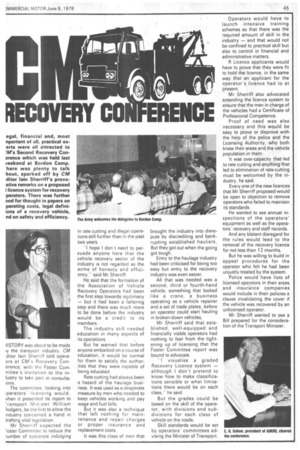RECOVERY CO ERENCE
Page 47

If you've noticed an error in this article please click here to report it so we can fix it.
egal, financial and, most nportant of all, practical exerts were all attracted to 'Ars Second Recovery Conerence which was held last mekend at Bordon Camp. here was plenty to talk bout, sparked off by 'CM ditor lain Sherriff's provoative remarks on a proposed ilicence system for recovery perators. There was further Dod for thought in papers on perating costs, legal definiions of a recovery vehicle, nd on safety and efficiency.
IISTORY was about to be made iy the transport industry, CM ditor lain Sherrill told operaors at CM's Recovery Coherence, with the Foster Cornnittee's invitatIon to the inlustry to take part in consultaions.
The committee, looking into iperators licensIng would, vhen it presented its report to -ransport Minister William lodgers, be the first to allow the ndustry concerned a hand in irafting vital legislation.
Mr Sherriff expected the 'osier Committee to reduce the umber of operators indulging in rate cutting and illegal operations still further than in the past two years.
"I hope I don't need to persuade anyone here that the vehicle recovery sector of the industry is not regarded as the acme of honesty and effici ency," said Mr Sherriff, .
He said that the formation of the Association of Vehicle Recovery Operators had been the first step towards legitimacy — but it had been a faltering step and there was much more to be done before the industry would be a credit to its members.
The industry still needed education in many aspects of its operations.
But he warned that before anyone embarked on a course of education, it would be normal for them to satisfy the author. ities that they were capable of being educated.
Rate cutting had always been a hazard of the haulage business. it was used as a desperate measure by men who needed to keep vehicles working and pay wage and fuel bills.
But it was also a technique that left nothing for maintenance and repair charges or proper insurance and replacement costs.
It was this class of men that brought the industry into disrepute by discrediting and bankrupting established hauliers„ But they got out when the going got tough.
Entry to the haulage industry had been criticised for being too easy but entry to the recovery industry was even easier.
All that was needed was a second, third or fourth-hand vehicle, something that looked like a crane, a business operating as a vehicle, repairer and a set of trade plates, before an operator could start hauling in broken-down vehicles:
Mr Sherriff said that established, well-equipped and financially viable, operators had nothing to fear from the tightening up of licensing that the Foster Committee report was bound to advocate.
"1 visualise a graded Recovery Licence system — although I don't pretend to know how to make classifications sensible or what limitations there would be on each class,he said.
But the grades could be based on the skill of the operator, with divisions and subdivisions for each class of vehicle on the roads.
Skill standards would be set by operators' committees advising the Minister of Transport. Operators would have to launch intensive training schemes so that there was the required amount of skill in the industry — and that would not be confined to practical skill but also to control in financial and administrative matters.
R Licence applicants would have to prove that they were fit to hold the licence, in the same way that an applicant for the operator's licence had to at .. present.
Mr Sherriff . also advocated extending the licence system to ensure that the man in charge of the vehicles had a Certificate of Professional Competence.
Proof of need was also necessary and this would be easy to prove or disprove with the help of the police and the Licensing Authority, who both knew their areas and the vehicle population in them.
It was over-capacity that led to rate cutting and anything that led to elimination of rate-cutting must be welcomed by the industry, he said.
Every one of the new licences that Mr Sherriff proposed would be open to objection to remove operators who failed to maintain its standards He wanted to see annual inspections of the operators' equipment as well as the operators' recovery and staff records.
And any blatant disregard for the rules would lead to the removal of the recovery licence for not less than 12 months.
But he was willing to build in appeal procedures for the operator who felt he had been unjustly treated by the system.
Police would have lists of licensed operators in their areas and insurance companies would include in their policies a clause invalidating the cover if the vehicle was recovered by an unlicensed operator.
Mr Sherriff wanted to see a Bill prepared for the consideration of the Transport Minister.




















































































































































